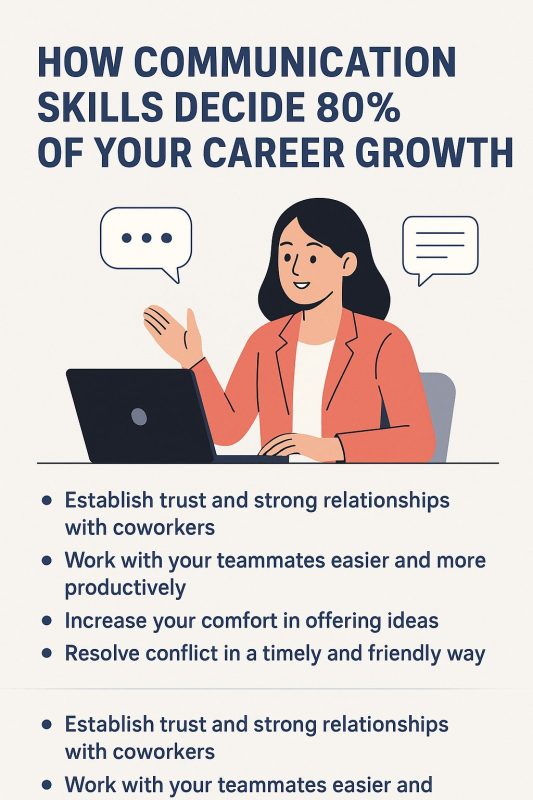Communication abilities determine nearly 80% of your career growth and affect your advancement and relationship building, in addition to eCareer success. Here is a structured, humanized, SEO-friendly blog post written in simple language for thevasuhour.com.
Why Communication Skills Matter Most
Many studies have shown that strong communication is a vital component of a successful career. Whether it’s a job interview, a weekly team meeting, or any other form of communication, the way we communicate and how we are received can lead to a lasting career success.
How Communication Skills Impact Career Growth
Being a good communicator can help:
- Establish trust and strong relationships with coworkers
- Work with your teammates easier and more productively
- Increase your comfort in offering ideas
- Resolve conflict in a timely and friendly way
- Open doors for promotions and leadership roles
The experts say success in your career is 80% to 85% related to communication and the other 15% is related to technical skills.
Real Examples of Communication Driving Success
- A manager leading a team with clear instructions sees projects finish on time, while vague communication causes confusion and delays.
- An employee who shares feedback kindly builds trust with coworkers, growing into a leadership position.
- Individuals who ask questions and listen actively stand out and get noticed by seniors.
Types of Workplace Communication
In terms of communication in the workplace context, workplace communication can be approached in a variety of ways. These approaches include:
- Verbal Communication – The making verbal statements clearly in meetings, conversation, and so on.
- Written Communication – Anything you are writing such as reports, sending emails, letters, etc.
- Nonverbal Communication – Use of body language, eye contact, facial expressions, etc.
- Listening – Listening to others when they are speaking, and listening to others’ perspectives.
Common Challenges at Work
Many employees in the workplace find themselves in the position of having anxiety and:
- Fear of saying something
- Misreading emails or texts
- Can’t explain something simply
- Can’t give or receive feedback
After an employee spends time working on rehabbing those communication challenges, they are able to surpass those pitfalls and increase their job satisfaction and potential development in their career paths.
Simple Ways to Improve Communication Skills
1. Listen Actively: In many if not all instances make an effort to be an active listener – paraphrase back, question, and find some way to go back and forth on the content at hand.
2. Be Straight Forward: Get rid of the jargon, and use words that are accessible to all people.
3. Be Aware of Body Language: Smile, maintain eye contact, and hold a body posture that is open.
4. Ask for Feedback: Asking people for feedback for how they perceive your communications, and feeling to the more extreme side of sympathy to that feedback can give you ideas about your rooms for improvement.
5. Be Conscious of Your Audience: It is important for you to speak through language and tone that is suitable for the audience in which you are engaging.
6. Use Technology: Technology will keep the team close,therefore use video-conferencing, chat, project apps, etc to keep connected with your team.
Communication Mistakes to Avoid
- Speaking too fast or too softly
- Interrupting others
- Writing long, unclear emails
- Ignoring feedback
If you take a moment to slow down, reflect, and consider how you can improve your mistakes, they can become learning opportunities.
Why Soft Skills Trump Hard Skills
Many employers hire candidates based on a better rate of pay than their level of qualifications or previous experience, but rather, their ability to communicate and ability to work as a team. Employees with soft skills who are empathetic, can listen without judgement, and use conflict resolutions, can successfully adjust to new skills and new challenges.

